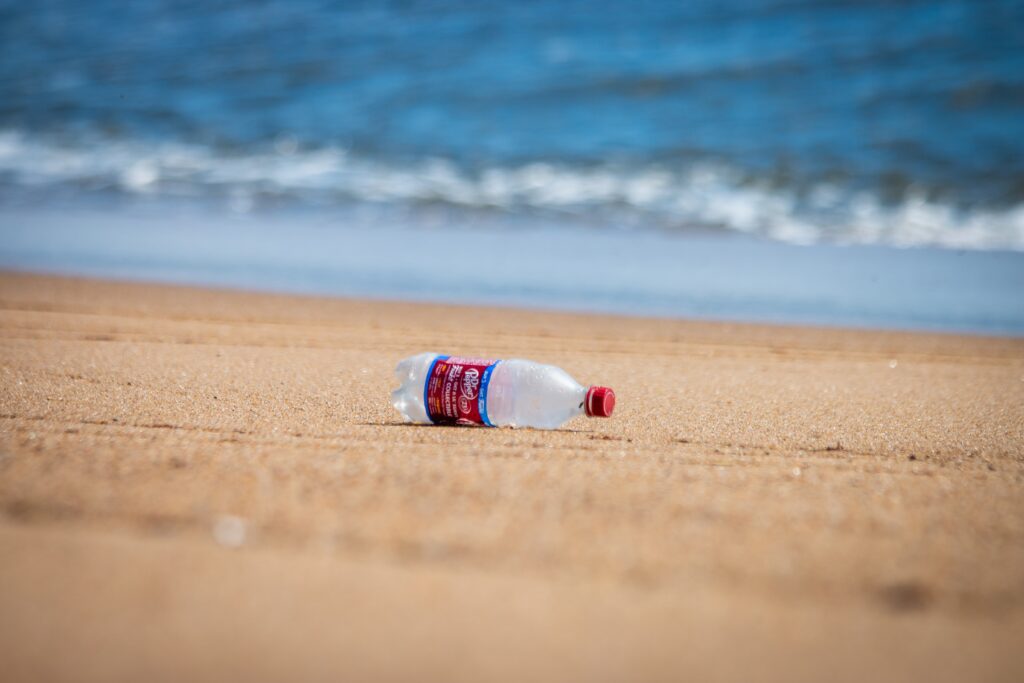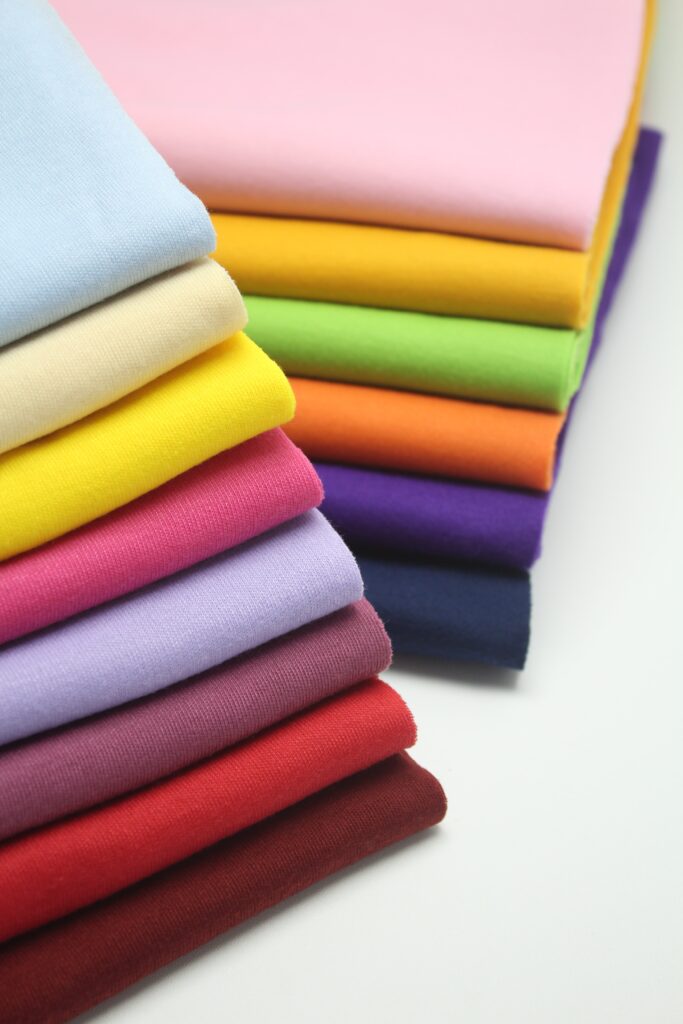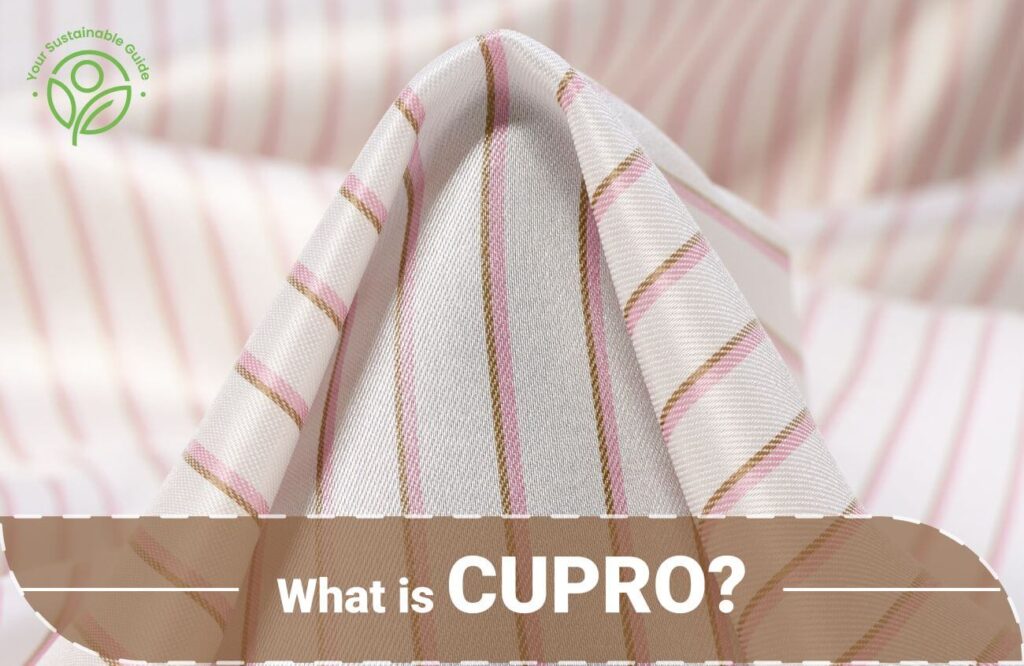Sustainable shoppers, do you usually frown and fend off when you come across polyester as a part of a clothing label’s composition? Well, You aren’t alone! Conscious shoppers like us share your dislike for virgin polyester because it is a synthetic fabric that consumes considerable energy and fuels like crude oil in its making. But would you trust us if we told you that not all polyester is terrible?
While our hatred doesn’t stop polyester from being one of the most produced fabrics in the world, a ‘greener version’ of this textile which is the Recycled Polyester fabric does exist. And this fabric does more good to the environment because it is made up of plastic garbage. Shocked? Well, it’s true. Polyester is a hit because it is cheap and consumers in the athleisure trend always look for resistant and stretchable garments in which this fabric fits perfectly. But Recycled Polyester fabric is already making it big in the fashion industry. With its fully synthetic nature, let’s explore whether Recycled Polyester fabric is really a sustainable fabric or not.

- What is Recycled Polyester Fabric?
- Is Recycled Polyester Fabric Sustainable?
- Is Recycled Polyester Fabric Affordable?
- Recycled Polyester Fabric Certifications
- Properties of Recycled Polyester Fabric
- Pros & Cons of Recycled Polyester Fabric
- Uses of Recycled Polyester Fabric
- How to Care for Recycled Polyester Fabric
- Famous Brands That Use Recycled Polyester Fabric
- Best Alternatives to Recycled Polyester Fabric
- Conclusion
What is Recycled Polyester Fabric?
Recycled Polyester fabric, also known as rPET is a fully synthetic material made from single-use plastic products like plastic bottles, bags, containers, etc. that are considered as garbage and have been dumped in landfills and oceans. These discarded plastic products have been a major concern for the environmental crisis of late. Hence, many brands have come forward to work out innovative ways like the idea of recycled polyester fabric, to give a second life and make this plastic waste fit for human use again.

Just like its counterpart (virgin polyester), recycled polyester is quite adaptable and can fill in the shoes of many different functions. From making clothing like thin and light stretchable activewear or thick and fuzzy sustainable fleece to industrial use products like car tires, ropes, and conveyer belts, rPET can be used in endless ways.
How is Recycled Polyester Fabric Made?

Recycled polyester or rPET, uses PET (Polyethylene Terephthalate) as the base material. PET is the same material used in single-use pet bottles, containers, etc.; and recycling this plastic garbage to create rPET prevents them from ending up in landfills. Recycled polyester is obtained by melting existing plastic waste and re-spinning it into a new form of polyester fiber yarn. While plastic products discarded by consumers are given much attention for recycled polyester manufacturing, rPET can also be easily made from post-industrial used plastic materials.
The manufacturing process begins with collecting, sterilizing, drying, and crushing PET bottles into small chips, which are then dissolved by extensive industrial heating. Next, this melted substance is forced through spinnerets to form fiber-like strings, which are then spun into spools and passed through a crimping machine to get a wooly texture. Finally, the yarn is dyed and knitted into recycled polyester fabric.
Recycled polyester can be made in two ways: Mechanical recycling, where plastic is melted to make new fiber. This process can be done only a few times as with every recycling process the fiber loses its quality. Next is, Chemical recycling, which breaks down plastic molecules and restructures them back into yarn. This process is more expensive as it maintains the quality of the original fiber and allows the material to be recycled infinite times.
Is Recycled Polyester Fabric Sustainable?
Yes, Recycled Polyester fabric is definitely a sustainable fabric for our wardrobe because recycled polyester was innovated to utilize the plastic waste that has been wreaking havoc on the planet and has become a global environmental issue. The United Nations recently reported that about 400 million tons of plastic is produced on a yearly basis, only 10% of which is recycled for further use.

PET is non-biodegradable and disposing it inappropriately after use is disastrous to human and environmental health. Polyester which is also known as PET (Polyethylene Terephthalate) is the most common type of plastic which consumes high energy and heavy manufacturing fuels with crude oil usage, leaving behind massive carbon emissions.
However, recycling this polyester to make rPET or Recycled Polyester, results in a considerable 45%-55% of energy savings and about 60% of carbon emissions reduction compared to polyester and creates a circular system of using materials that already exist and are causing water and air pollution along with soil contamination.
Is Recycled Polyester Fabric Affordable?

Yes, Recycled Polyester fabric is affordable. It is priced similarly to recycled nylon, both of them being synthetic fabrics that are regenerated versions of virgin polyester and virgin nylon. Since the recycled polyester fabric is produced from already existing materials, that is, PET, no extra costs are involved in sourcing or processing the raw material for this fabric, hence making it a more sustainable and affordable option.
Recycled Polyester Fabric Certifications
For chemical restrictions and environmental along with social best practices, always check out the following certifications for Recycled polyester fabric-
Properties of Recycled Polyester Fabric
Recycled polyester offers almost the same properties as virgin polyester, but with significant gains for the betterment of the planet.
- Recycled polyester fabric is eco-friendly.
- It is lightweight and durable.
- Recycled polyester is quick-drying and crease-resistant.
- It is easy to dye and absorbs colors fast.
- It is economical just like polyester, making it suitable to replace virgin polyester.
- Recycled polyester is stretchable making it perfect to be used in sportswear.
- It is water-resistant.
Pros & Cons of Recycled Polyester Fabric
Pros
- Recycled polyester is a way to keep plastic from entering oceans and landfills and give them a second life.
- Recycled polyester has all the qualities of virgin polyester but requires fewer resources and energy to be manufactured.
- It doesn’t depend on fossil fuels for production.
- It is lightweight and strong.
- It is easy to wash and wrinkle-free.
- Recycled polyester has moisture-wicking abilities and is water-repellant.
- It has great thermal comfort.
- It is resistant to fungi, moths, and other fabric-attacking insects.
Cons
- Recycled polyester is non-biodegradable.
- Recycled polyester is mostly blended with other materials for creating clothing items. This, in turn, makes recycling the fabric again to be impossible.
- Recycled polyester releases microplastics (microscopic plastic particles), just like any other synthetic fiber. It might be a solution to keep plastic waste out of oceans, but it does contribute to microplastic pollution.
- Polyester can be recycled only when the chips are white in color but colors vary because the plastic generated can be of different colors. Dyers use chlorine-based bleach multiple times till the color white is achieved. All this activity does contribute to environmental impact.
- It is less breathable.
- It locks in sweat and moisture, resulting in the locking of odor that is hard to cover up.
Uses of Recycled Polyester Fabric

Recycled polyester is used to make clothing like casual everyday clothing, denim, swimwear, activewear, outdoor garments, shoes, accessories like bags, backpacks and belts, industrial yarns, and ropes used, car tires and reinforcements, conveyer belts, upholstery, cushions, quilts, etc. The incorporation of recycled polyester into different products is endless.
How to Care for Recycled Polyester Fabric
- First of all, always check the garment’s label for specific wash and care instructions.
- For washing use a mild laundry detergent and set the water temperature in your washing machine to normal or cold.
- Clean stains by hand by soaking them in a detergent solution for some time.
- Air dry your clothes for best results.
Famous Brands That Use Recycled Polyester Fabric
A considerable number of sustainable brands have joined the Recycled polyester fabric bandwagon. Some of our favorites are listed below-
- Patagonia
- Adidas
- Tentree
- H&M
- Toad & Co.
- Finisterre
- ECOALF
- Riz Boardshorts
- prAna
- The North Face
- Lucy & Yak
- Reformation
- Veja
Best Alternatives to Recycled Polyester Fabric
Econyl – Econyl also known as Nylon 6 is a type of recycled nylon that has similar properties to recycled polyester. Made from nylon-based waste materials like old fishing nets and other industrial waste collected from oceans, Econyl is considered the most innovative regenerated fabric. It is water-resistant, strong, lightweight, easily absorbs moisture, and crease-resistant, just like recycled polyester.
Lyocell – A semi-synthetic fabric made from a concoction of eucalyptus trees’ wood pulp and amine oxide solution, Lyocell is lightweight, durable, soft, and extremely breathable. It also has amazing moisture-wicking abilities just like recycled polyester, making it perfect for activewear.
Modal – Modal is another innovative semi-synthetic fabric made from wood pulp derived from sustainably grown beech trees. It is super soft, breathable, and comfortable compared to synthetic textiles. Plus, it is wrinkle-resistant and biodegradable.
Conclusion
Recycled Polyester is one of some fantastic examples of how sustainable textile innovations and conscious brands of the clothing industry work to find solutions to catastrophic social and environmental impacts. But recycled polyester fabrics cannot be considered the future of sustainable fabrics because it does have environmental impacts.
Apologies for breaking the bubble but you read that right! The recycled polyester fabric was made just to delay PET from ending up in landfills because once PET is recycled and converted into a product, it is next to impossible to revive the fabric again for later use, but the hazards of recycled polyester are much lower than virgin polyester made from petroleum. So as of now, it is a sustainable fabric that you should choose over polyester and nylon.







